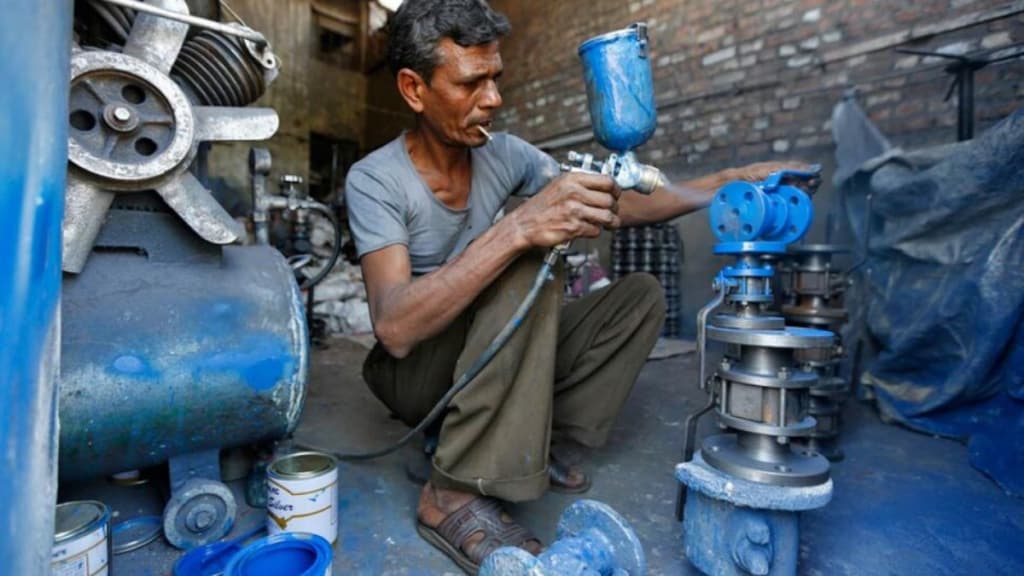By Pushan Sharma
It is difficult to imagine India has catapulted to an orbit of frenetic economic growth because of businesses that are perennially short of cash and sustain without crucial policy guarantees or extraordinary marketing strategies.
But that is the truth—micro, small and medium enterprises (MSMEs) are indeed the unsung heroes of one of the world’s fastest growing economies.
The segment comprises over 6.3 crore of these enterprises, spread across the country. And these account for a third of India’s approximately $3.5 trillion gross domestic product (GDP), contribute to about half of its exports, and employ around 11 crore people.
Despite their crucial role in the economy, MSMEs continue to toil under severe challenges and need sustained policy support and interventions.
Much like Sisyphus of Greek mythology, who was condemned by the gods into an endless cycle of labour, pushing a huge boulder up a hill only to have it rolled down.
For India to realise its vaunted growth aspirations, it is imperative to ensure MSMEs break out of that cycle, and soon.
Credit is critical
According to a 2023 report by the International Finance Corporation, micro, small and medium enterprises (MSMEs) face a global credit gap of nearly $5.7 trillion, highlighting credit is critical for MSME growth. Accessible credit enables MSMEs to invest in technology, infrastructure and market expansion.
CRISIL Market Intelligence and Analytics estimates that MSME credit grew a robust 21-22% on-year in fiscal 2024 to Rs 35 lakh crore and will maintain the pace in fiscal 2025.
Despite the healthy pace, there is a significant credit gap and low credit penetration in this segment.
A 2022 Finance Committee report indicates a credit gap of Rs 20-25 lakh crore in India, underscoring a significant funding shortfall. Many MSMEs lack sufficient collateral, and their financial records often do not meet banking standards. As a result, the formal credit penetration rate is only 20%. Credit is a critical aspect for MSMEs, evident from the fact that two-thirds of the overall MSME budget allocation is dedicated to credit support.
The cost of capital from the informal segment is extremely high. Banks are overly cautious when lending to this segment and focus largely on collateral-based lending. Moreover, MSMEs face issues in making timely payments, which impacts their capital position.
That underlines the need for higher allocation for providing credit to MSMEs.
To this end, the government can draw lessons from global best practices to tailor its funding strategies.
Japan, for one, has an extensive credit guarantee system managed by the Japan Finance Corporation (JFC) and a network of 52 Credit Guarantee Corporations. These organisations extend guarantees to MSMEs that lack sufficient collateral or credit history to secure loans. The system ensures that even high-risk MSMEs can access the necessary financing.
JFC also provides sector-level support to MSMEs. In the agricultural sector, for instance, its Agriculture, Forestry, Fisheries, and Food Business Unit offers financial products and services tailored specifically for businesses within these industries.
In the context, the takeaways for India:
- Establish a network of regional credit guarantee corporations to provide localised support
- Develop sector-specific financial support programmes tailored to the unique needs of different industries such as agriculture, manufacturing and technology
- Offer additional support services such as business advisory and financial planning to ensure the success of the guaranteed MSMEs
Additionally, banks can use alternative data from Goods and Services Tax and tax filings to enhance credit risk assessment of MSMEs and increase formal credit penetration.
Market access key to expansion
Apart from credit requirement, easy access to both global as well as local markets is critical for MSMEs as they contribute to about half of India’s exports.
Such support would be timely as the rise of global value chains and digital transformation provides MSMEs opportunities to integrate into the world economy.
In Germany, for instance, the government provides extensive support to bolster the export capabilities of Mittelstand companies, which contribute significantly to its status as a global trade powerhouse. These small and medium-sized enterprises (SMEs) are highly specialised and often dominate niche markets worldwide. The German Trade and Invest agency actively supports these MSMEs by facilitating their entry into international markets through trade fairs, comprehensive market research, and export financing solutions.
The German government’s commitment to export promotion ensures that Mittelstand companies can compete globally, leverage their innovative capabilities and sustain long-term growth. By fostering a robust export infrastructure, Germany enables its MSMEs to expand their reach and maintain their competitive edge on the international stage. This way, the Mittelstand contributes to roughly half of Germany’s GDP and accounts for more than two-thirds of the nation’s exports.
Singapore, too, provides MSMEs an integrated support system through various initiatives. Enterprise Singapore offers grants, loans and capability development programmes to bolster MSME growth. The Market Readiness Assistance Grant helps MSMEs expand internationally by covering costs associated with overseas market set-up, business partner identification and market promotion. In addition, the MSME Go Digital programme assists the enterprises in adopting digital technologies to enhance productivity and market reach.
India must draw upon these models to improve its financial support systems for MSMEs, offer structured assistance to promote exports and encourage them to venture into niche markets.
The government should also support MSMEs with market research, competitive analysis and go-to-market strategies.
The confluence of these interventions will ensure Indian MSMEs break out and reach their full potential. The budget can spur that change.
(Pushan Sharma is Director- Research, CRISIL Market Intelligence and Analytics)
(Disclaimer: Views expressed are personal and do not reflect the official position or policy of Financial Express Online. Reproducing this content without permission is prohibited.)

